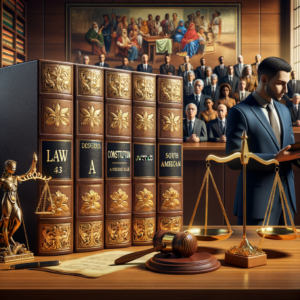Unraveling Courtroom Drama: Shocking Revelations That Changed Justice
The courtroom has long been a stage for drama, where the stakes are high and the outcomes can change lives forever. Over the years, various cases have not only captivated public attention but have also redefined the very fabric of justice. Recent revelations in high-profile trials have unveiled shocking truths that challenge existing legal norms and ethical standards. This article delves into the evolution of courtroom drama, key cases that have reshaped legal precedents, unforeseen testimonies that altered trial outcomes, the media's role in public perception, ethical dilemmas arising from legal misconduct, and the future implications of these revelations on legal practices.
The Evolution of Courtroom Drama: A Historical Perspective on Justice
Courtroom drama has evolved significantly over the centuries, reflecting societal values and the legal landscape of the time. In ancient civilizations, trials were often public spectacles, where the accused faced their fate in front of a crowd. As legal systems became more formalized, the focus shifted from public opinion to procedural justice, with an emphasis on evidence and legal representation. The 20th century marked a turning point, as landmark cases began to highlight the intersection of law and morality, leading to a more nuanced understanding of justice. The O.J. Simpson trial in the 1990s, for instance, not only captivated audiences but also sparked discussions about race, celebrity, and the legal system's integrity. Today, courtroom dramas continue to unfold, revealing the complexities of justice in an increasingly interconnected world.
Key Cases That Redefined Legal Precedents and Shook the Justice System
Throughout history, certain cases have emerged as pivotal moments that redefined legal precedents and shook the justice system to its core. The landmark case of Brown v. Board of Education (1954) abolished racial segregation in public schools, setting a precedent for civil rights litigation. Similarly, the Supreme Court's ruling in Roe v. Wade (1973) established a woman's right to choose, igniting ongoing debates about reproductive rights. More recently, the trial of George Floyd's murderer, Derek Chauvin, not only resulted in a historic conviction for police misconduct but also catalyzed a global movement for racial justice and police reform. These cases illustrate how courtroom decisions can resonate far beyond the legal realm, influencing societal norms and expectations regarding justice.
Unforeseen Testimonies: Witness Accounts That Altered Trial Outcomes
Witness testimonies have the power to dramatically alter the course of a trial, often leading to unexpected outcomes. In the case of the 1995 trial of O.J. Simpson, the testimony of forensic expert Dr. Henry Lee introduced new evidence that challenged the prosecution's narrative, ultimately contributing to Simpson's acquittal. Similarly, the recent trial of Elizabeth Holmes, founder of Theranos, hinged on the testimonies of former employees who revealed the inner workings of the company and its deceptive practices. These unforeseen testimonies not only highlight the unpredictability of courtroom proceedings but also underscore the critical role that eyewitness accounts play in shaping the narrative and influencing jurors' perceptions.
The Role of Media in Shaping Public Perception of Courtroom Events
The media plays a crucial role in shaping public perception of courtroom events, often acting as both a conduit for information and a catalyst for public opinion. High-profile trials are frequently covered extensively, with live broadcasts and sensational headlines that can sway public sentiment before a verdict is even reached. The coverage of the Casey Anthony trial in 2011, for example, sparked a national debate about motherhood, responsibility, and the media's influence on justice. In the age of social media, the rapid dissemination of information can amplify biases and lead to a trial by public opinion, complicating the legal process and raising questions about the fairness of trials in the court of law.
Ethical Dilemmas: The Impact of Legal Misconduct on Justice Delivery
Legal misconduct poses significant ethical dilemmas that can undermine the integrity of the justice system. Instances of prosecutorial misconduct, such as withholding evidence or engaging in deceptive practices, have been documented in various cases, leading to wrongful convictions and miscarriages of justice. The case of the "Central Park Five," where five teenagers were wrongfully convicted of assault and rape, exemplifies the devastating consequences of legal misconduct. The subsequent exoneration of the accused highlighted systemic flaws within the legal framework and the urgent need for reforms to ensure accountability and transparency. As the justice system grapples with these ethical challenges, the call for stricter oversight and ethical guidelines becomes increasingly imperative.
Future Implications: How Recent Revelations May Transform Legal Practices
Recent revelations in high-profile trials have the potential to transform legal practices and reshape the future of justice. As society becomes more aware of issues such as racial bias, prosecutorial misconduct, and the influence of media, there is a growing demand for reforms that promote fairness and equity in the legal system. The increasing use of technology, such as artificial intelligence and data analytics, in legal proceedings may also revolutionize how evidence is presented and evaluated. Furthermore, the ongoing discourse surrounding restorative justice and alternative dispute resolution methods reflects a shift towards more holistic approaches to justice. As these trends continue to evolve, the legal landscape will likely adapt to meet the changing expectations of society.
The courtroom remains a dynamic arena where drama unfolds and justice is pursued. As shocking revelations continue to emerge, they challenge the status quo and prompt critical discussions about the integrity of the legal system. By examining the historical evolution of courtroom drama, key cases that have redefined legal precedents, the impact of unforeseen testimonies, the role of media, ethical dilemmas, and future implications, we gain valuable insights into the complexities of justice. As we move forward, it is essential to remain vigilant in our pursuit of a fair and equitable legal system that upholds the principles of justice for all.
